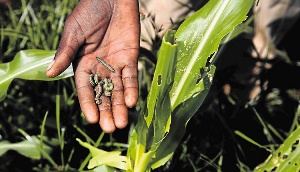 The armyworms invaded several farms in the Ashanti, Brong Ahafo, Volta, Eastern Region
The armyworms invaded several farms in the Ashanti, Brong Ahafo, Volta, Eastern Region
The Minister of Food and Agriculture, Dr. Owusu Afriyie Akoto, has beaten a retreat on his earlier claim that the fall armyworm invasion has been totally defeated.
The fall armyworm is a biological phenomenon. They have been here in Ghana for two years, in Africa for two years. They will become part of our fauna. Ultimately, they will be here,” he told Host of Morning Starr Francis Abban Wednesday.
He added, “Since this is a phenomena the armyworm is here and they have come to stay. They will never go away. The challenge is to control them and I am saying that we have controlled them.”
Dr. Afriyie Akoto’s recent comments contradict earlier statement on the floor of Parliament in July on the menace.
“Mr. Speaker, I want to assure the nation that the fall armyworm invasion has been defeated totally,” he declared then.
The armyworms invaded several farms in the Ashanti, Brong Ahafo, and Volta, Eastern, and the Northern regions early this year, destroying over 15,000 hectares of farmlands.
Speaking on Morning Starr Wednesday, September 13, 2017, the Member of Parliament for Builsa South, Dr. Clement Apaak dismissed the Minister’s claim as inaccurate.
“As we speak now, the problem continues to exist and the sooner we admit that it is with us…so that we can start looking at whatever remedial actions that can be taken, the better for us as a nation.
“…This is not because one wants to be a doomsday prophet. I am worried about the livelihood and the survival of my constituents. They have invested their time and resources and their energy in these farms,” said the former presidential staffer.
Also, the General Secretary of the Ghana Agricultural Workers’ Union (GAWU), Edward Kaware described the declaration as “palpably false.”
But, in his reaction, Dr. Afriyie Akoto debunked the stance of GAWU and Dr. Apaak as incomprehensible.
“The point of the matter is that those who are seeing the success of planting for food and jobs want to tarnish that success by saying that there are some worms hiding somewhere eating all the surpluses and bringing hunger rather than the bumper the surpluses have brought,” he said.